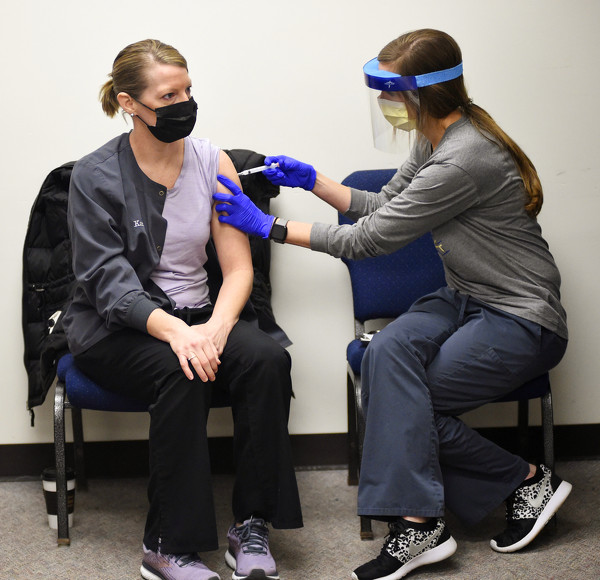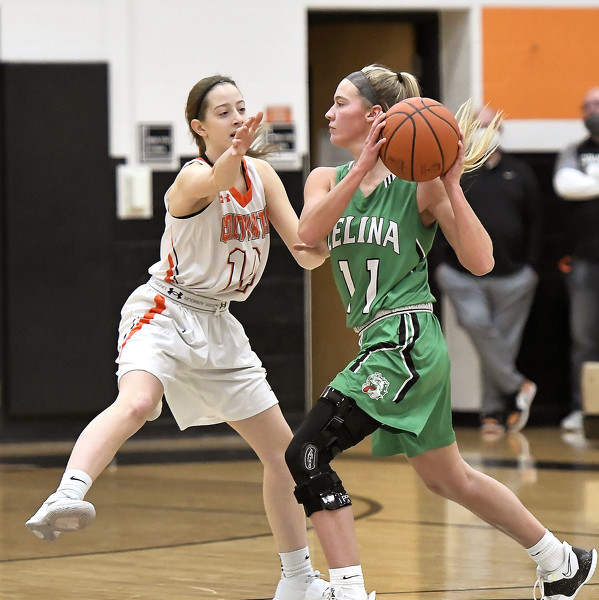
A health care worker receives a COVID-19 vaccine shot Dec. 30 at the Mercer County Central Services Building.
As COVID-19 continues to spread, health officials have said vaccines are the best way to end the pandemic. But with so much information to sift through and rampant misinformation, some may be hesitant as to whether the vaccines are safe and effective.
Local and national health experts weighed in on some myths and the facts regarding available COVID-19 vaccines.
For example, a myth persists that the vaccines aren't safe because they were rushed into development.
The fact is, although the COVID-19 vaccines themselves were recently developed, the technology used to create them has been studied for decades.
The Moderna and Pfizer-BioNTech vaccines use messenger RNA, or mRNA. While this is the first time it's being widely used in a vaccine for the public, researchers have been working on this vaccine strategy for more than three decades, according to the Cleveland Clinic.
Vaccine manufacturers also put their vaccines through rigorous clinical trials involving tens of thousands of volunteers. Both Modern and Pfizer-BioNTech vaccines received emergency use authorization by the U.S. Food and Drug Administration.
According to the Mayo Clinic, to receive emergency use authorization, the biopharmaceutical manufacturer must have followed at least half of the study participants for at least two months after completing the vaccination series, and the vaccine must be proven safe and effective in that population.
The Pfizer-BioNTech vaccine was 95% effective, and the Moderna vaccine was 94% effective in phase 3 clinical trials with more than 70,000 participants between the two studies.
In addition, the approval process condensed timelines and reduced or eliminated monthslong waiting periods. That time would usually be spent on preparing documents or waiting for documents to be reviewed.
Another widespread myth suggests people who have recovered from COVID-19 don't need to get the vaccine.
Auglaize County Health Department nursing director Brenda Eiting and Mercer County Health District Nursing Director Julia Shaffer agreed it's important to get vaccinated for COVID-19, even if a person has had the virus and recovered.
Experts still don't know how long someone is protected from getting sick again after recovering from COVID-19, which is why getting vaccinated is important, Eiting said.
"While most people do recover from COVID-19, there are people who have severe complications," Eiting said. "There are many people who have been affected by COVID-19, and we need to do our part.
It's still a pandemic, and we're making history. (Do) anything to protect yourself, your community and survive."
Those who have had COVID-19 should delay vaccination until about 90 days from diagnosis, Shaffer said. People should not get vaccinated if in quarantine after exposure or if they have COVID-19 symptoms.
One rumor suggests vaccines that use mRNA can alter a person's DNA or genetic makeup.
The truth is messenger ribonucleic acid, or mRNA, is not able to alter or modify a person's genetic makeup.
The mRNA from a COVID-19 vaccine never enters the nucleus of the cell, which is where DNA is kept, and therefore does not affect or interact with DNA in any way, according to the Ohio Department of Health.
The mRNA from COVID-19 vaccines can most easily be described as a set of instructions for the body on how to make a harmless piece of "spike protein" to allow the immune systems to recognize that this protein doesn't belong there and begin building an immune response and making antibodies.
Essentially, COVID-19 vaccines that use mRNA work with the body's natural defenses to safely develop immunity to the virus, giving cells a blueprint of how to make antibodies.
Another rumor: COVID-19 vaccines were developed as a way to control the general population through microchips or other tracking devices.
Wrong. No vaccine injections, including the shots for COVID-19, contain microchips, nanochips, RFID trackers or devices that would track or control a person's body in any way. The vaccine will not track people or gather personal information into a database.
The myth started after comments made by Bill Gates from the Bill & Melinda Gates Foundation about a digital certificate of vaccine records, according to the Mayo Clinic.
The Mayo Clinic says the technology he was referencing is not a microchip, has not been implemented in any manner, and is not tied to the development, testing or distribution of the COVID-19 vaccine.
Both Pfizer and Moderna have published the ingredient lists for their vaccines. In addition to the COVID-19 mRNA, both vaccines contain lipids, or fats, that help deliver the mRNA into the cells, according to the Cleveland Clinic. There are also a few other common ingredients that help maintain the pH and stability of the vaccine.
One stubborn myth says COVID-19 vaccines were developed using fetal cells.
The fact is fetal cells were not used in the design, development, or production of Pfizer-BioNTech and Moderna COVID-19 vaccines. COVID-19 vaccines do not require the use of fetal cell cultures in the production process, according to the Mayo clinic.
One persistent myth suggests COVID-19 vaccines cause infertility or other serious medical problems.
In the Pfizer-BioNTech phase 3 clinical trial of more than 43,000 individuals, and the Moderna phase 3 clinical trial with 30,000 participants, no serious safety concerns were observed, according to the ODH.
The most common side effects were fatigue, headache, soreness or redness at the injection site, and muscle or joint pain. Shaffer has said side effects are proof the body is reacting to the vaccine and making antibodies. Side effects are usually mild and last for only a few hours or a few days.
A popular myth says COVID-19 vaccines can infect people with COVID-19.
The truth is people cannot get COVID-19 from any vaccine in development. None of the COVID-19 vaccines currently in development in the U.S. use the live virus that causes COVID-19, according to ODH.
It typically takes a few weeks for the body to build immunity after vaccination. Some vaccines require two doses, including the Pfizer-BioNTech and Moderna products. That means it is possible that a person could be infected with the virus that causes COVID-19 just before, or just after, getting the vaccination and become sick, since it takes the vaccine time to provide protection.
People may experience fatigue, muscle aches, a headache or a fever after getting the vaccine. However, the Cleveland Clinic writes those symptoms are normal for any vaccine and are a sign that the immune system is responding.
Another common myth: COVID-19 vaccines will be mandatory for every Ohioan.
But no COVID-19 vaccine currently available can be mandated, Shaffer has said.
Because there is an urgent need for COVID-19 vaccines and the FDA's approval process can take months to years, the FDA has given emergency use authorization to Moderna and Pfizer-BioNTech vaccines. However, emergency use authorization is not the same as getting the FDA's approval.
Emergency use authorization is an alternative evaluation process that's designed to vet things more quickly than the usual FDA approval regimen. Until the FDA fully approves the vaccines, not just approve them for emergency use, the vaccines cannot be mandated.
Even if the vaccines are fully approved, the federal government cannot mandate the vaccine for the general population. States and cities can, but the state of Ohio will not require anyone to get the COVID-19 vaccine, according to ODH. The vaccine will be available to all Ohioans who choose to receive it, as available supply of the vaccine increases.
Children also will not be forced to get a vaccine because they are not yet eligible to receive it. The COVID-19 vaccines that have received emergency use authorization are not recommended for children under age 16.
Finally, there is a widespread rumor that people won't need to wear masks or social distance after getting the vaccine.
Fact: People should still wear masks and practice social distancing after being vaccinated. It may take time for everyone who wants a COVID-19 vaccination to get one. Also, while the vaccine may prevent a person from getting sick, it is unknown at this time if a person can still carry and transmit the virus to others after vaccination, according to the Mayo Clinic.
Until more is understood about how well the vaccine works, continuing with precautions such as mask-wearing, physical distancing and washing hands frequently will be important.
The Cleveland Clinic also says that both vaccines currently available require two doses given three to four weeks apart to achieve the best possible immunity. When a person gets their first shot, they do not immediately become immune, so getting a second dose is critical.
If people still have hesitations about getting vaccinated, Shaffer said people can reach out to someone who's received it or ask their primary care provider about their experience. Shaffer said when she was vaccinated she had soreness and redness in her arm for a day and was back to normal the next day.
For more information, visit ODH's website at coronavirus.ohio.gov, the FDA's website on COVID-19 vaccines at www.fda.gov/emergency-preparedness-and-response/coronavirus-disease-2019-covid-19/covid-19-vaccines, or the Centers for Disease Control and Prevention's website on vaccines at www.cdc.gov/coronavirus/2019-ncov/vaccines/facts.html.
Myth: COVID-19 vaccines aren't safe because they were rushed
Fact: The U.S. Federal Drug Administration has given emergency use authorization to Moderna and Pfizer/BioNTech vaccines. Emergency use authorization is an alternative evaluation process that's designed to vet things more quickly than the usual FDA approval regimen. The Pfizer/BioNTech vaccine was 95% effective, and the Moderna vaccine was 94% effective in final stage clinical trials.
Myth: If a person has had COVID-19 and recovered, they don't need to get the vaccine.
Fact: Experts don't know how long someone is protected from getting sick again after recovering from COVID-19.
Myth: Vaccines that use mRNA can alter a person's DNA or genetic makeup
Fact: The mRNA from a COVID-19 vaccine never enters the nucleus of the cell, which is where DNA is kept, and therefore does not affect or interact with DNA in any way.
Myth: COVID-19 vaccines will be mandatory for every Ohioan.
Fact: No COVID-19 vaccine currently available can be mandated because they are only approved for emergency use. Children won't be forced to get a vaccine because COVID-19 vaccines that have received emergency use authorization are not recommended for children under age 16.
Myth: COVID-19 vaccines will track or control people through microchips or other tracking devices.
Fact: No vaccine injections, including the shots for COVID-19, contain microchips, nanochips, RFID trackers or devices that would track or control a person's body in any way.
Myth: COVID-19 vaccines were developed using fetal cells.
Fact: Fetal cells were not used in the design, development, or production of Pfizer-BioNTech and Moderna COVID-19 vaccines. The vaccines don't require fetal cell cultures to be produced.
Myth: COVID-19 vaccines cause infertility or other serious medical problems.
Fact: No serious safety concerns were observed in phase 3 clinical trials for either vaccine currently available.
Myth: People can get COVID-19 from the vaccines
Fact: People can't get COVID-19 from any vaccine available in the U.S. because none use the live virus that causes it.
Myth: People won't need to wear masks or social distance after getting the vaccine.
Fact: People should still take precautions because it will take time for everyone who wants a vaccine to get one. And while the vaccine may prevent a person from getting sick, it is unknown at this time if a person can still carry and transmit the virus to others after vaccination.
